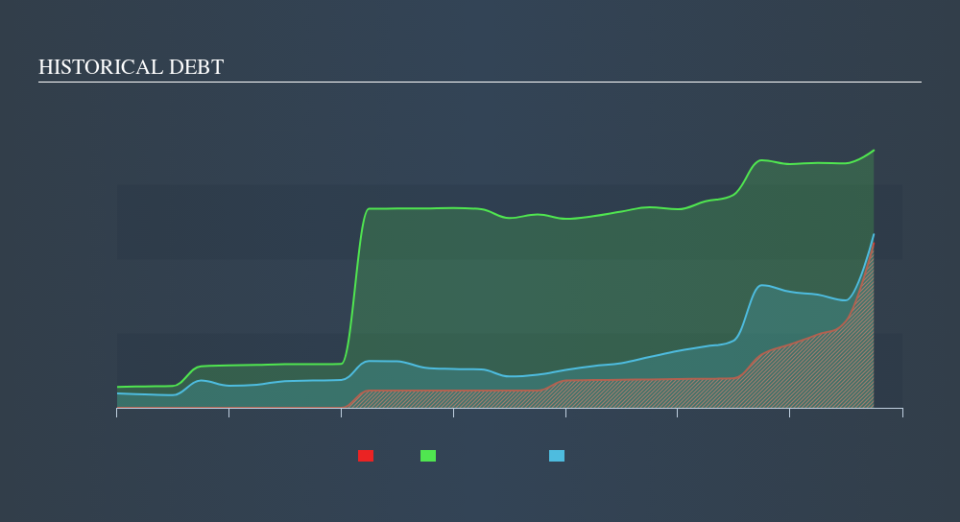Does Zillow Group (NASDAQ:ZG) Have A Healthy Balance Sheet?

Howard Marks put it nicely when he said that, rather than worrying about share price volatility, 'The possibility of permanent loss is the risk I worry about... and every practical investor I know worries about. It's only natural to consider a company's balance sheet when you examine how risky it is, since debt is often involved when a business collapses. We note that Zillow Group, Inc. (NASDAQ:ZG) does have debt on its balance sheet. But is this debt a concern to shareholders?
When Is Debt Dangerous?
Debt is a tool to help businesses grow, but if a business is incapable of paying off its lenders, then it exists at their mercy. Ultimately, if the company can't fulfill its legal obligations to repay debt, shareholders could walk away with nothing. However, a more common (but still painful) scenario is that it has to raise new equity capital at a low price, thus permanently diluting shareholders. By replacing dilution, though, debt can be an extremely good tool for businesses that need capital to invest in growth at high rates of return. The first step when considering a company's debt levels is to consider its cash and debt together.
View our latest analysis for Zillow Group
What Is Zillow Group's Debt?
The image below, which you can click on for greater detail, shows that at September 2019 Zillow Group had debt of US$2.21b, up from US$715.0m in one year. However, it does have US$2.32b in cash offsetting this, leading to net cash of US$116.5m.
How Strong Is Zillow Group's Balance Sheet?
Zooming in on the latest balance sheet data, we can see that Zillow Group had liabilities of US$907.6m due within 12 months and liabilities of US$1.72b due beyond that. Offsetting these obligations, it had cash of US$2.32b as well as receivables valued at US$77.7m due within 12 months. So it has liabilities totalling US$222.8m more than its cash and near-term receivables, combined.
Since publicly traded Zillow Group shares are worth a total of US$7.75b, it seems unlikely that this level of liabilities would be a major threat. However, we do think it is worth keeping an eye on its balance sheet strength, as it may change over time. Despite its noteworthy liabilities, Zillow Group boasts net cash, so it's fair to say it does not have a heavy debt load! When analysing debt levels, the balance sheet is the obvious place to start. But it is future earnings, more than anything, that will determine Zillow Group's ability to maintain a healthy balance sheet going forward. So if you're focused on the future you can check out this free report showing analyst profit forecasts.
In the last year Zillow Group wasn't profitable at an EBIT level, but managed to grow its revenue by73%, to US$2.2b. With any luck the company will be able to grow its way to profitability.
So How Risky Is Zillow Group?
By their very nature companies that are losing money are more risky than those with a long history of profitability. And the fact is that over the last twelve months Zillow Group lost money at the earnings before interest and tax (EBIT) line. Indeed, in that time it burnt through US$855m of cash and made a loss of US$302m. While this does make the company a bit risky, it's important to remember it has net cash of US$116.5m. That means it could keep spending at its current rate for more than two years. With very solid revenue growth in the last year, Zillow Group may be on a path to profitability. By investing before those profits, shareholders take on more risk in the hope of bigger rewards. For riskier companies like Zillow Group I always like to keep an eye on whether insiders are buying or selling. So click here if you want to find out for yourself.
Of course, if you're the type of investor who prefers buying stocks without the burden of debt, then don't hesitate to discover our exclusive list of net cash growth stocks, today.
We aim to bring you long-term focused research analysis driven by fundamental data. Note that our analysis may not factor in the latest price-sensitive company announcements or qualitative material.
If you spot an error that warrants correction, please contact the editor at editorial-team@simplywallst.com. This article by Simply Wall St is general in nature. It does not constitute a recommendation to buy or sell any stock, and does not take account of your objectives, or your financial situation. Simply Wall St has no position in the stocks mentioned. Thank you for reading.

 Yahoo Finance
Yahoo Finance 
